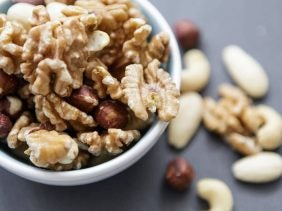5 reasons why your weight loss has plateaued, even if you’re cutting calories
 ©Jacob_Ammentorp_Lund
©Jacob_Ammentorp_Lund
You’re working out regularly and keeping track of your calories, but your weight isn’t changing. How is that possible? We give you tips to overcome and prevent a weight loss plateau.
While exercising regularly and managing your diet are important aspects of weight loss, eating too little while exercising a lot is not always enough to lose as many pounds as you want. Instead, a combination of eating the right kind of food, the right amount of calories, and doing the right activities is what will really help you lose weight.
So your weight loss has plateaued—here are five reasons that might be happening.
Though you exercise regularly and have a strict diet, you may have noticed that you’re no longer losing weight. Here’s why.
1. When your metabolism adapts to your new weight it can slow down further weight loss.
The amount of calories your body needs is constantly changing, especially when you lose weight. The longer you eat fewer calories, though, the more your metabolism will slow down.
Basically, as you lose weight and your metabolism slows down, your body burns fewer calories than it did at your previous weight, meaning your current calorie deficit may not be low enough to enable your body to continue losing weight. This is usually when your weight loss journey can start to plateau.
When your body has adjusted to your original calorie deficit, you must further reduce it if you want to continue losing weight. As long as you’re cutting calories, what you eat can vary though. Be sure to maintain a high protein diet with lots of fiber and a small portion of complex carbohydrates. These nutrients will keep you satisfied and happy.
2. Muscle growth also causes weight loss to plateau.
If you exercise regularly while you’re dieting, you’ll start to see changes in your body very soon. Whatever activity you’re doing, whether cardio or strength training, your muscles will grow and you’ll lose fat through regular exercise.
Changes in the way your body looks can also lead your weight loss to plateau, even if you’re noticing that your love handles are starting to melt away. Your muscles work like energy centers: They burn calories even while they’re resting, which helps your body become more muscular despite the fact that you may not notice a change on the scale.
For your body composition to change, adopting a protein-rich diet is essential. More protein means more muscle. Our Shape Shake is the ideal drink to help your reach your goals, because it’s both delicious and full of protein. Of course, protein-rich snacks aren’t a bad idea either.
If you start to gain weight because of that, don’t worry. Muscles weigh about 10% more than fat, because they’re denser and composed of 80% water.

3. Poorly executed and irregular training can interrupt weight loss.
Exercise and weight loss go hand in hand, but we often forget that our workouts need to be adapted to our objectives. Overly intense activities, heavy weights, and irregular sessions may not produce long term results.
You always have to find a balance. Regular exercise, well-chosen workouts at a moderate intensity, and variations in your exercise program will ensure that your weight loss does not plateau.
4. And So Can Stress hormones.
Long term, your weight may plateau if you exercise too intensely or don’t eat enough protein. However, if you don’t give your body enough time to recover, it will produce additional stress hormones, which can lead to symptoms like fatigue, lack of energy, and feeling weak.
Cortisol, in particular, prevents sugar and fat from being transported to and burned by your muscles, and, as a result, the nutrients you do consume end up being transported to fat cells.
Muscles use the body’s proteins to convert amino acids into glucose, which is what gives us energy. But if sugar and fat doesn’t have a chance to be transported to your muscles because of high cortisol levels, your muscle mass may start to disappear.

5. You may be eating more calories than you realize.
Eating extra calories is one of the main reasons why weight loss stagnates. For one, that’s because it’s common to overestimate the calories burned during a workout which frequently results in eating more calories than necessary. Even if you’re working out at a high intensity regularly, it’s essential to ensure that you’re eating 300 to 500 fewer calories a day to guarantee results.
Especially at the beginning of a diet, it’s essential to stick to a healthy eating plan composed of protein-rich foods.
Your weight will gradually decrease and so will your daily calorie requirement. If you don’t adapt your diet and eating habits when you lose weight, your original calorie deficit may not be enough to help you continue to see results. Be sure to adapt your eating plan as you progress, or, if you need it, get advice from a professional.
Our Balance Sheet
Anyone’s weight loss can plateau, which is why your exercise and eating plans must be regularly adapted and optimized to help you reach your goals.
- Eat a lot of protein and fiber.
- Your calorie needs will change on a daily basis.
- Forget drastic diets and eat healthy.
- Set clear rules when it comes to weighing yourself.
- Allow plenty of time for breaks, recovery, and sleep.
Sources for this article
We at foodspring use only high-quality sources, including peer-reviewed studies, to support the facts within our articles. Read our editorial policy to learn more about how we fact-check and keep our content accurate, reliable, and trustworthy.























